SCHOOL OF COMPUTING AND MATHS: Ethical Theory in Data Collection
VerifiedAdded on 2023/03/17
|7
|1979
|86
Essay
AI Summary
This essay, submitted by a student, analyzes the ethical issues surrounding the online collection and harvesting of personal data, focusing on a case study from Charles Sturt University. The student explores the ethical dimensions of data collection, particularly concerning personality assessments and the potential misuse of collected information. The essay critically examines the case through the lens of four classical ethical theories: utilitarianism, deontology, virtue ethics, and contract theory. It argues that the practice of collecting personal data, especially when used for undisclosed purposes, such as political campaigns, raises significant ethical concerns, including breaches of trust and confidentiality. The analysis highlights how each ethical theory offers a unique perspective on the morality of such actions, ultimately concluding that the case study reveals unethical practices due to potential violations of individual privacy and the potential for data misuse. The student emphasizes the importance of maintaining data confidentiality and upholding ethical standards in data collection to build a better society.
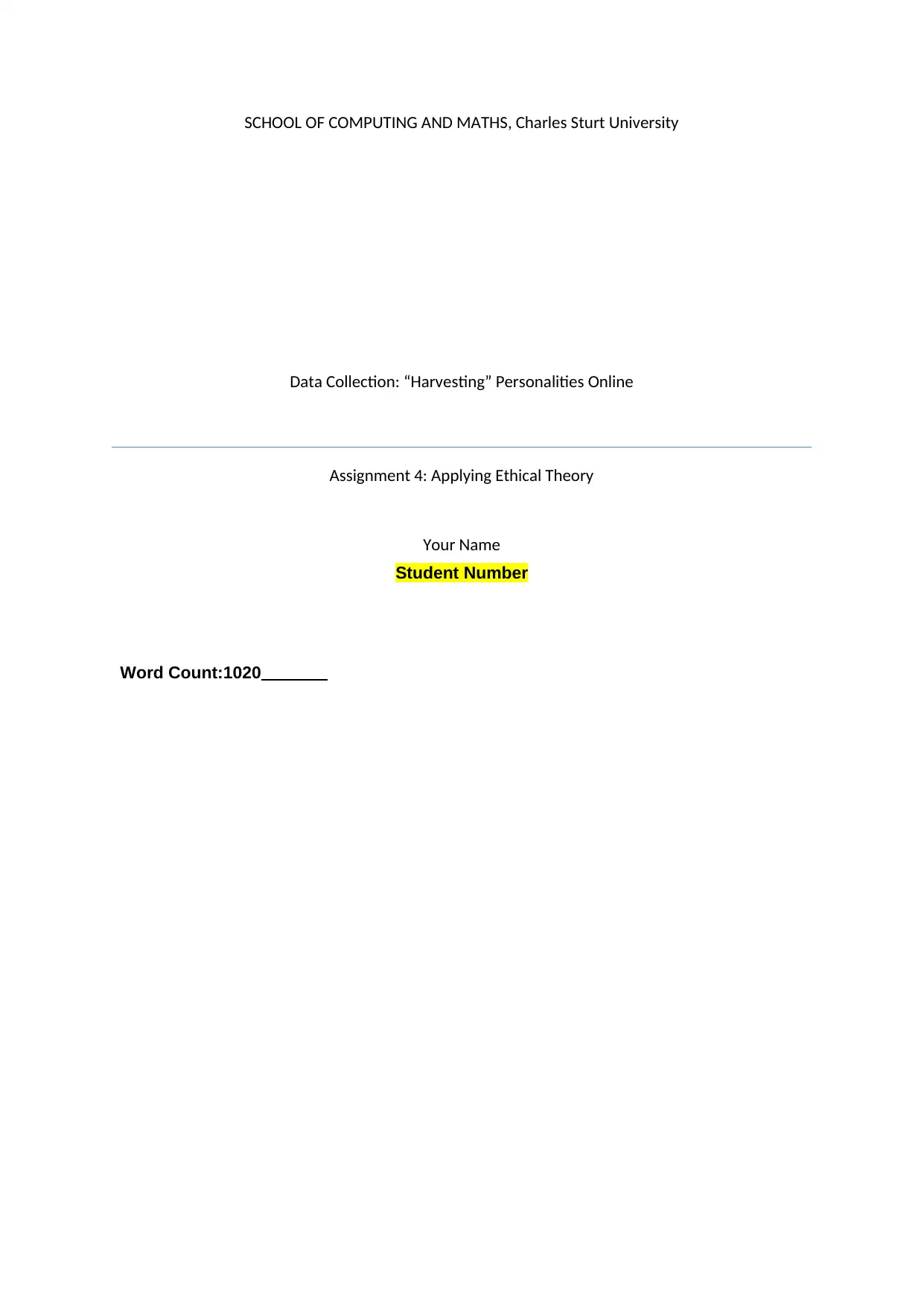
SCHOOL OF COMPUTING AND MATHS, Charles Sturt University
Data Collection: “Harvesting” Personalities Online
Assignment 4: Applying Ethical Theory
Your Name
Student Number
Word Count:1020
Data Collection: “Harvesting” Personalities Online
Assignment 4: Applying Ethical Theory
Your Name
Student Number
Word Count:1020
Paraphrase This Document
Need a fresh take? Get an instant paraphrase of this document with our AI Paraphraser
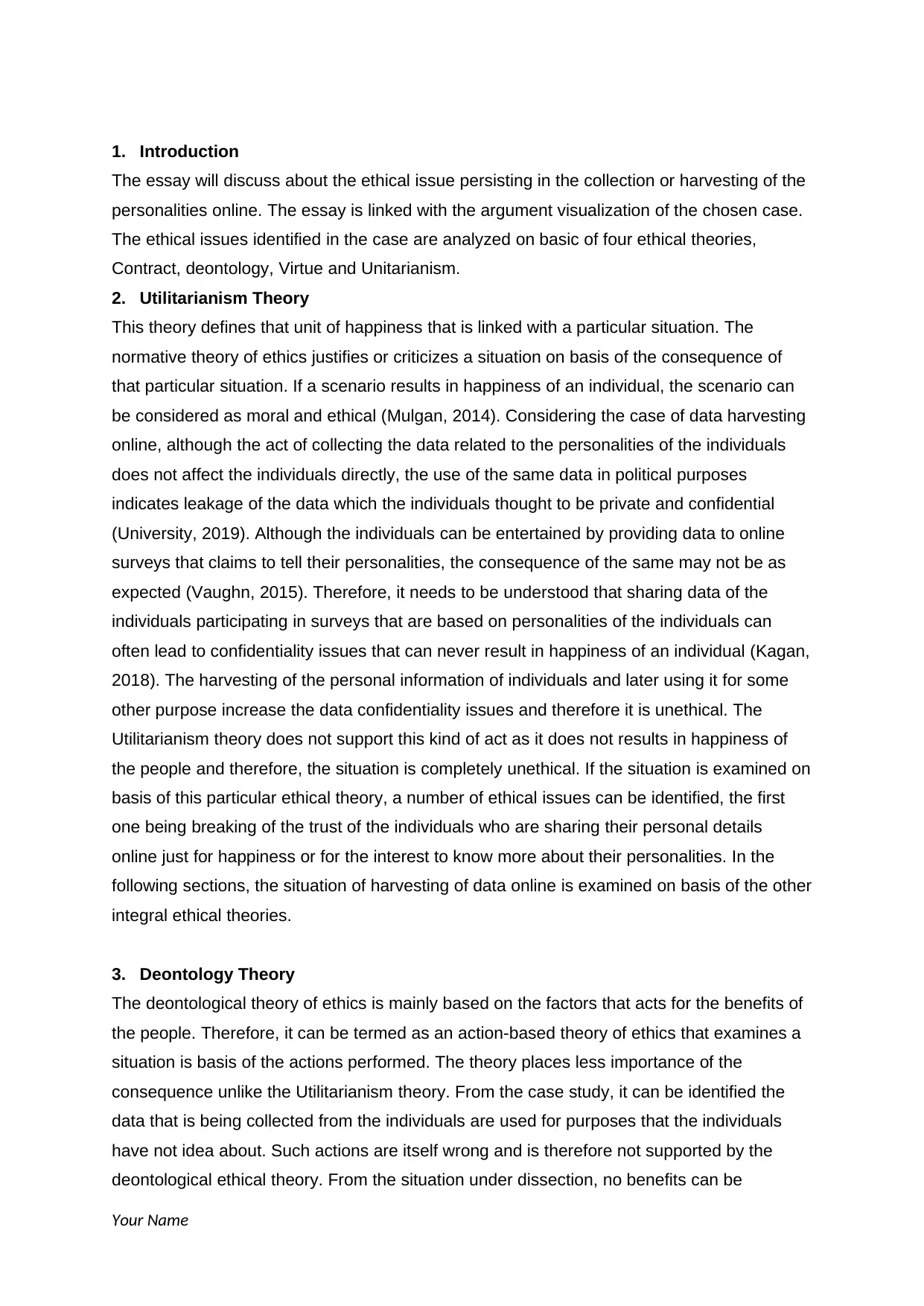
1. Introduction
The essay will discuss about the ethical issue persisting in the collection or harvesting of the
personalities online. The essay is linked with the argument visualization of the chosen case.
The ethical issues identified in the case are analyzed on basic of four ethical theories,
Contract, deontology, Virtue and Unitarianism.
2. Utilitarianism Theory
This theory defines that unit of happiness that is linked with a particular situation. The
normative theory of ethics justifies or criticizes a situation on basis of the consequence of
that particular situation. If a scenario results in happiness of an individual, the scenario can
be considered as moral and ethical (Mulgan, 2014). Considering the case of data harvesting
online, although the act of collecting the data related to the personalities of the individuals
does not affect the individuals directly, the use of the same data in political purposes
indicates leakage of the data which the individuals thought to be private and confidential
(University, 2019). Although the individuals can be entertained by providing data to online
surveys that claims to tell their personalities, the consequence of the same may not be as
expected (Vaughn, 2015). Therefore, it needs to be understood that sharing data of the
individuals participating in surveys that are based on personalities of the individuals can
often lead to confidentiality issues that can never result in happiness of an individual (Kagan,
2018). The harvesting of the personal information of individuals and later using it for some
other purpose increase the data confidentiality issues and therefore it is unethical. The
Utilitarianism theory does not support this kind of act as it does not results in happiness of
the people and therefore, the situation is completely unethical. If the situation is examined on
basis of this particular ethical theory, a number of ethical issues can be identified, the first
one being breaking of the trust of the individuals who are sharing their personal details
online just for happiness or for the interest to know more about their personalities. In the
following sections, the situation of harvesting of data online is examined on basis of the other
integral ethical theories.
3. Deontology Theory
The deontological theory of ethics is mainly based on the factors that acts for the benefits of
the people. Therefore, it can be termed as an action-based theory of ethics that examines a
situation is basis of the actions performed. The theory places less importance of the
consequence unlike the Utilitarianism theory. From the case study, it can be identified the
data that is being collected from the individuals are used for purposes that the individuals
have not idea about. Such actions are itself wrong and is therefore not supported by the
deontological ethical theory. From the situation under dissection, no benefits can be
Your Name
The essay will discuss about the ethical issue persisting in the collection or harvesting of the
personalities online. The essay is linked with the argument visualization of the chosen case.
The ethical issues identified in the case are analyzed on basic of four ethical theories,
Contract, deontology, Virtue and Unitarianism.
2. Utilitarianism Theory
This theory defines that unit of happiness that is linked with a particular situation. The
normative theory of ethics justifies or criticizes a situation on basis of the consequence of
that particular situation. If a scenario results in happiness of an individual, the scenario can
be considered as moral and ethical (Mulgan, 2014). Considering the case of data harvesting
online, although the act of collecting the data related to the personalities of the individuals
does not affect the individuals directly, the use of the same data in political purposes
indicates leakage of the data which the individuals thought to be private and confidential
(University, 2019). Although the individuals can be entertained by providing data to online
surveys that claims to tell their personalities, the consequence of the same may not be as
expected (Vaughn, 2015). Therefore, it needs to be understood that sharing data of the
individuals participating in surveys that are based on personalities of the individuals can
often lead to confidentiality issues that can never result in happiness of an individual (Kagan,
2018). The harvesting of the personal information of individuals and later using it for some
other purpose increase the data confidentiality issues and therefore it is unethical. The
Utilitarianism theory does not support this kind of act as it does not results in happiness of
the people and therefore, the situation is completely unethical. If the situation is examined on
basis of this particular ethical theory, a number of ethical issues can be identified, the first
one being breaking of the trust of the individuals who are sharing their personal details
online just for happiness or for the interest to know more about their personalities. In the
following sections, the situation of harvesting of data online is examined on basis of the other
integral ethical theories.
3. Deontology Theory
The deontological theory of ethics is mainly based on the factors that acts for the benefits of
the people. Therefore, it can be termed as an action-based theory of ethics that examines a
situation is basis of the actions performed. The theory places less importance of the
consequence unlike the Utilitarianism theory. From the case study, it can be identified the
data that is being collected from the individuals are used for purposes that the individuals
have not idea about. Such actions are itself wrong and is therefore not supported by the
deontological ethical theory. From the situation under dissection, no benefits can be
Your Name
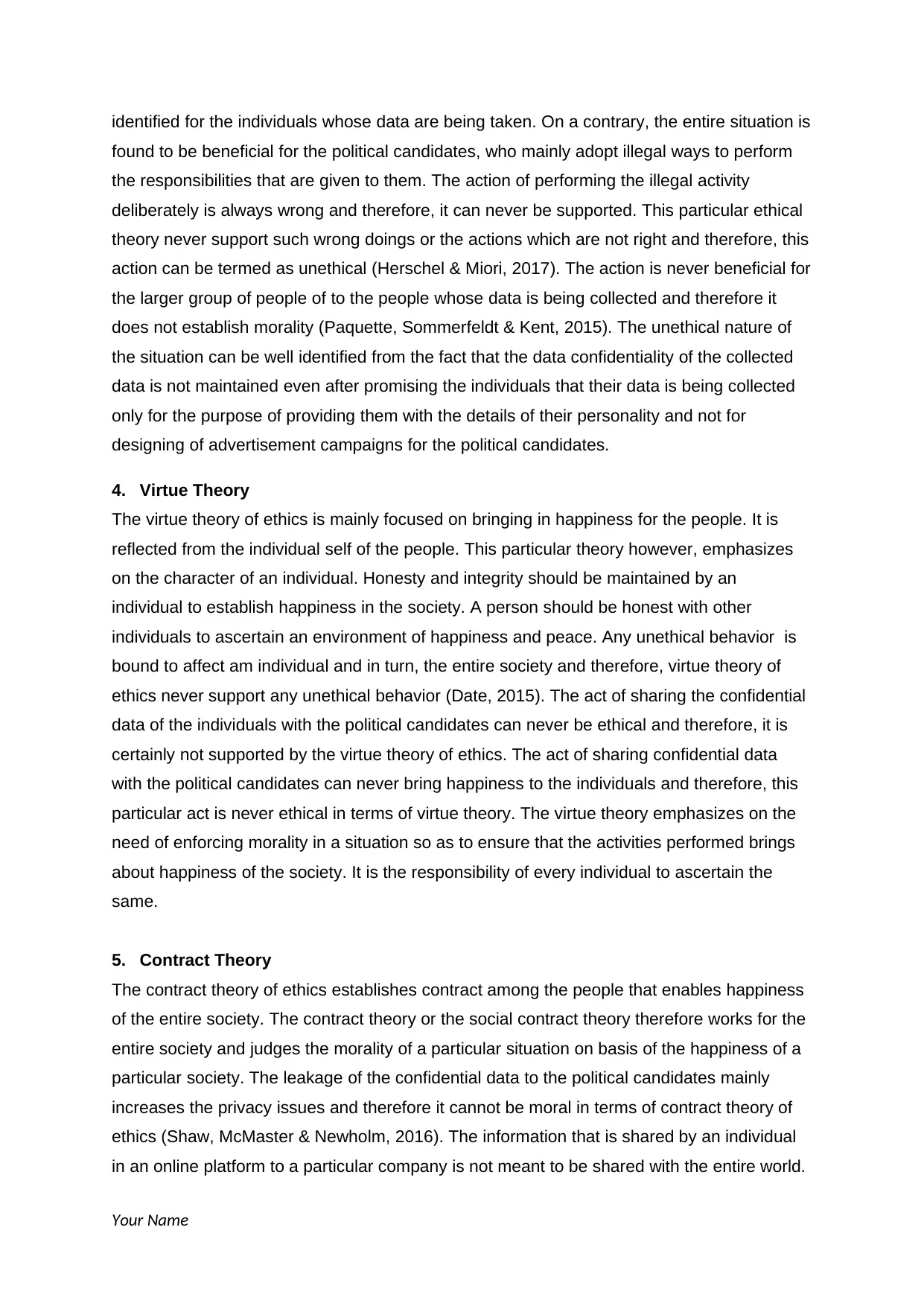
identified for the individuals whose data are being taken. On a contrary, the entire situation is
found to be beneficial for the political candidates, who mainly adopt illegal ways to perform
the responsibilities that are given to them. The action of performing the illegal activity
deliberately is always wrong and therefore, it can never be supported. This particular ethical
theory never support such wrong doings or the actions which are not right and therefore, this
action can be termed as unethical (Herschel & Miori, 2017). The action is never beneficial for
the larger group of people of to the people whose data is being collected and therefore it
does not establish morality (Paquette, Sommerfeldt & Kent, 2015). The unethical nature of
the situation can be well identified from the fact that the data confidentiality of the collected
data is not maintained even after promising the individuals that their data is being collected
only for the purpose of providing them with the details of their personality and not for
designing of advertisement campaigns for the political candidates.
4. Virtue Theory
The virtue theory of ethics is mainly focused on bringing in happiness for the people. It is
reflected from the individual self of the people. This particular theory however, emphasizes
on the character of an individual. Honesty and integrity should be maintained by an
individual to establish happiness in the society. A person should be honest with other
individuals to ascertain an environment of happiness and peace. Any unethical behavior is
bound to affect am individual and in turn, the entire society and therefore, virtue theory of
ethics never support any unethical behavior (Date, 2015). The act of sharing the confidential
data of the individuals with the political candidates can never be ethical and therefore, it is
certainly not supported by the virtue theory of ethics. The act of sharing confidential data
with the political candidates can never bring happiness to the individuals and therefore, this
particular act is never ethical in terms of virtue theory. The virtue theory emphasizes on the
need of enforcing morality in a situation so as to ensure that the activities performed brings
about happiness of the society. It is the responsibility of every individual to ascertain the
same.
5. Contract Theory
The contract theory of ethics establishes contract among the people that enables happiness
of the entire society. The contract theory or the social contract theory therefore works for the
entire society and judges the morality of a particular situation on basis of the happiness of a
particular society. The leakage of the confidential data to the political candidates mainly
increases the privacy issues and therefore it cannot be moral in terms of contract theory of
ethics (Shaw, McMaster & Newholm, 2016). The information that is shared by an individual
in an online platform to a particular company is not meant to be shared with the entire world.
Your Name
found to be beneficial for the political candidates, who mainly adopt illegal ways to perform
the responsibilities that are given to them. The action of performing the illegal activity
deliberately is always wrong and therefore, it can never be supported. This particular ethical
theory never support such wrong doings or the actions which are not right and therefore, this
action can be termed as unethical (Herschel & Miori, 2017). The action is never beneficial for
the larger group of people of to the people whose data is being collected and therefore it
does not establish morality (Paquette, Sommerfeldt & Kent, 2015). The unethical nature of
the situation can be well identified from the fact that the data confidentiality of the collected
data is not maintained even after promising the individuals that their data is being collected
only for the purpose of providing them with the details of their personality and not for
designing of advertisement campaigns for the political candidates.
4. Virtue Theory
The virtue theory of ethics is mainly focused on bringing in happiness for the people. It is
reflected from the individual self of the people. This particular theory however, emphasizes
on the character of an individual. Honesty and integrity should be maintained by an
individual to establish happiness in the society. A person should be honest with other
individuals to ascertain an environment of happiness and peace. Any unethical behavior is
bound to affect am individual and in turn, the entire society and therefore, virtue theory of
ethics never support any unethical behavior (Date, 2015). The act of sharing the confidential
data of the individuals with the political candidates can never be ethical and therefore, it is
certainly not supported by the virtue theory of ethics. The act of sharing confidential data
with the political candidates can never bring happiness to the individuals and therefore, this
particular act is never ethical in terms of virtue theory. The virtue theory emphasizes on the
need of enforcing morality in a situation so as to ensure that the activities performed brings
about happiness of the society. It is the responsibility of every individual to ascertain the
same.
5. Contract Theory
The contract theory of ethics establishes contract among the people that enables happiness
of the entire society. The contract theory or the social contract theory therefore works for the
entire society and judges the morality of a particular situation on basis of the happiness of a
particular society. The leakage of the confidential data to the political candidates mainly
increases the privacy issues and therefore it cannot be moral in terms of contract theory of
ethics (Shaw, McMaster & Newholm, 2016). The information that is shared by an individual
in an online platform to a particular company is not meant to be shared with the entire world.
Your Name
⊘ This is a preview!⊘
Do you want full access?
Subscribe today to unlock all pages.

Trusted by 1+ million students worldwide
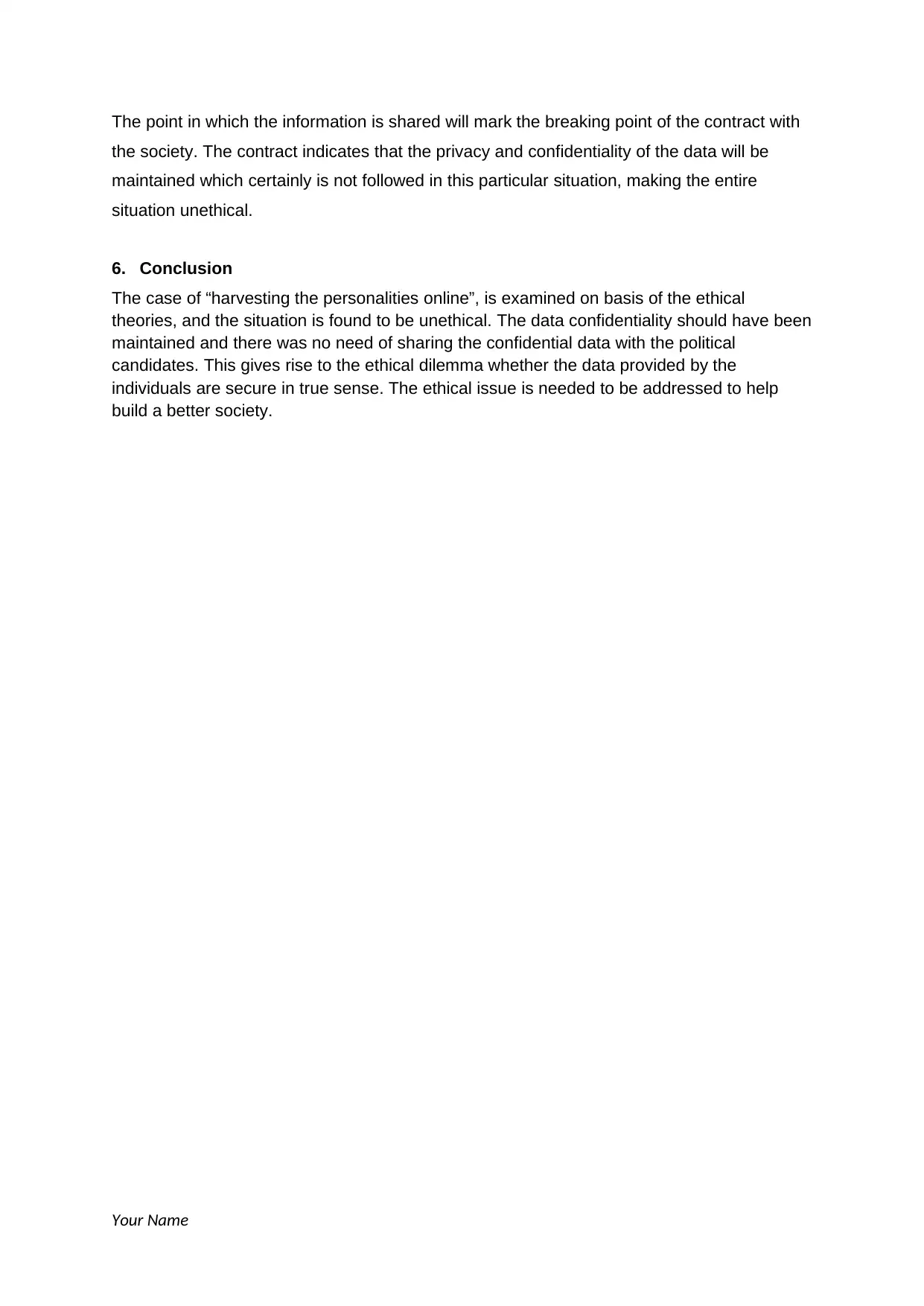
The point in which the information is shared will mark the breaking point of the contract with
the society. The contract indicates that the privacy and confidentiality of the data will be
maintained which certainly is not followed in this particular situation, making the entire
situation unethical.
6. Conclusion
The case of “harvesting the personalities online”, is examined on basis of the ethical
theories, and the situation is found to be unethical. The data confidentiality should have been
maintained and there was no need of sharing the confidential data with the political
candidates. This gives rise to the ethical dilemma whether the data provided by the
individuals are secure in true sense. The ethical issue is needed to be addressed to help
build a better society.
Your Name
the society. The contract indicates that the privacy and confidentiality of the data will be
maintained which certainly is not followed in this particular situation, making the entire
situation unethical.
6. Conclusion
The case of “harvesting the personalities online”, is examined on basis of the ethical
theories, and the situation is found to be unethical. The data confidentiality should have been
maintained and there was no need of sharing the confidential data with the political
candidates. This gives rise to the ethical dilemma whether the data provided by the
individuals are secure in true sense. The ethical issue is needed to be addressed to help
build a better society.
Your Name
Paraphrase This Document
Need a fresh take? Get an instant paraphrase of this document with our AI Paraphraser
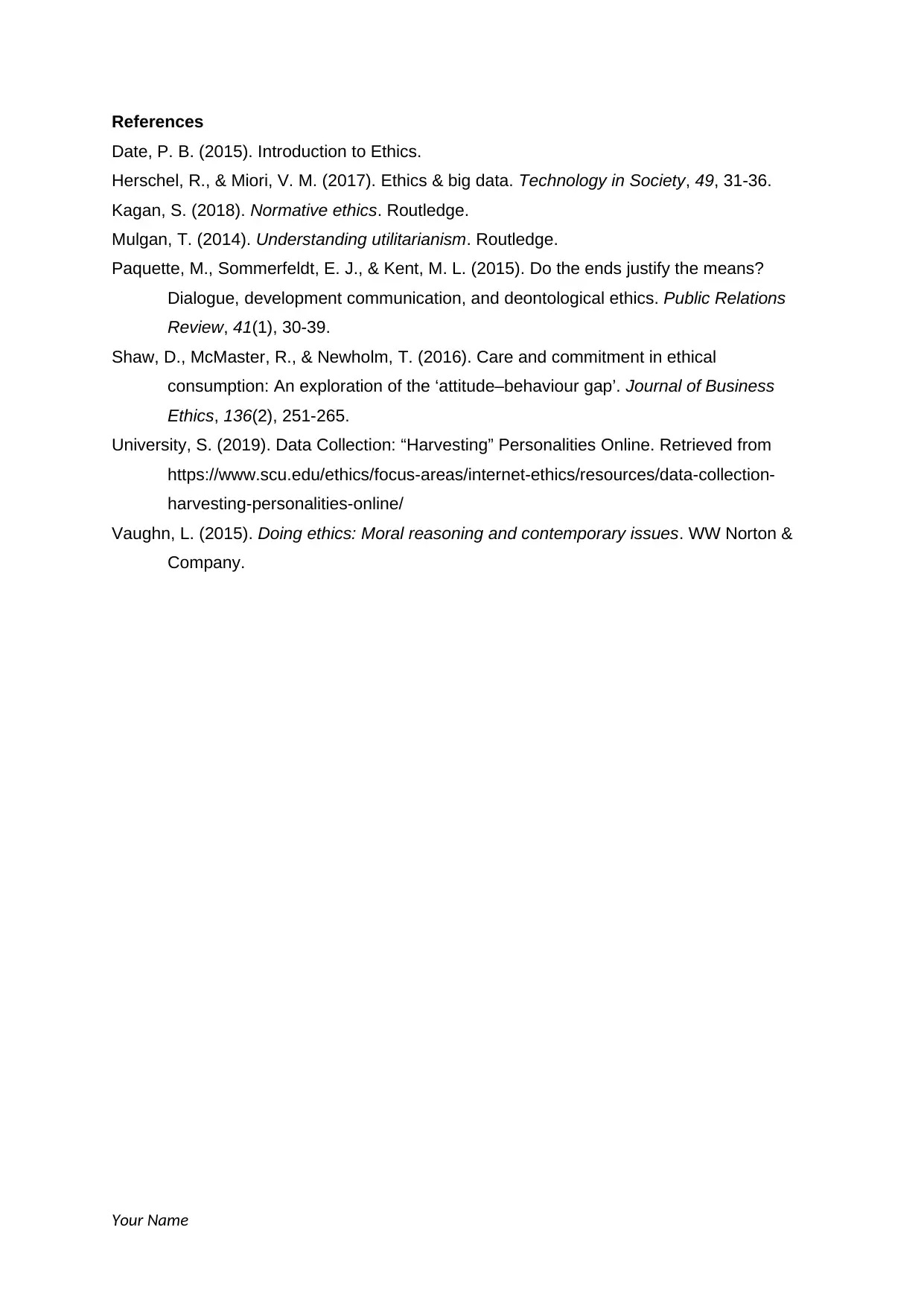
References
Date, P. B. (2015). Introduction to Ethics.
Herschel, R., & Miori, V. M. (2017). Ethics & big data. Technology in Society, 49, 31-36.
Kagan, S. (2018). Normative ethics. Routledge.
Mulgan, T. (2014). Understanding utilitarianism. Routledge.
Paquette, M., Sommerfeldt, E. J., & Kent, M. L. (2015). Do the ends justify the means?
Dialogue, development communication, and deontological ethics. Public Relations
Review, 41(1), 30-39.
Shaw, D., McMaster, R., & Newholm, T. (2016). Care and commitment in ethical
consumption: An exploration of the ‘attitude–behaviour gap’. Journal of Business
Ethics, 136(2), 251-265.
University, S. (2019). Data Collection: “Harvesting” Personalities Online. Retrieved from
https://www.scu.edu/ethics/focus-areas/internet-ethics/resources/data-collection-
harvesting-personalities-online/
Vaughn, L. (2015). Doing ethics: Moral reasoning and contemporary issues. WW Norton &
Company.
Your Name
Date, P. B. (2015). Introduction to Ethics.
Herschel, R., & Miori, V. M. (2017). Ethics & big data. Technology in Society, 49, 31-36.
Kagan, S. (2018). Normative ethics. Routledge.
Mulgan, T. (2014). Understanding utilitarianism. Routledge.
Paquette, M., Sommerfeldt, E. J., & Kent, M. L. (2015). Do the ends justify the means?
Dialogue, development communication, and deontological ethics. Public Relations
Review, 41(1), 30-39.
Shaw, D., McMaster, R., & Newholm, T. (2016). Care and commitment in ethical
consumption: An exploration of the ‘attitude–behaviour gap’. Journal of Business
Ethics, 136(2), 251-265.
University, S. (2019). Data Collection: “Harvesting” Personalities Online. Retrieved from
https://www.scu.edu/ethics/focus-areas/internet-ethics/resources/data-collection-
harvesting-personalities-online/
Vaughn, L. (2015). Doing ethics: Moral reasoning and contemporary issues. WW Norton &
Company.
Your Name
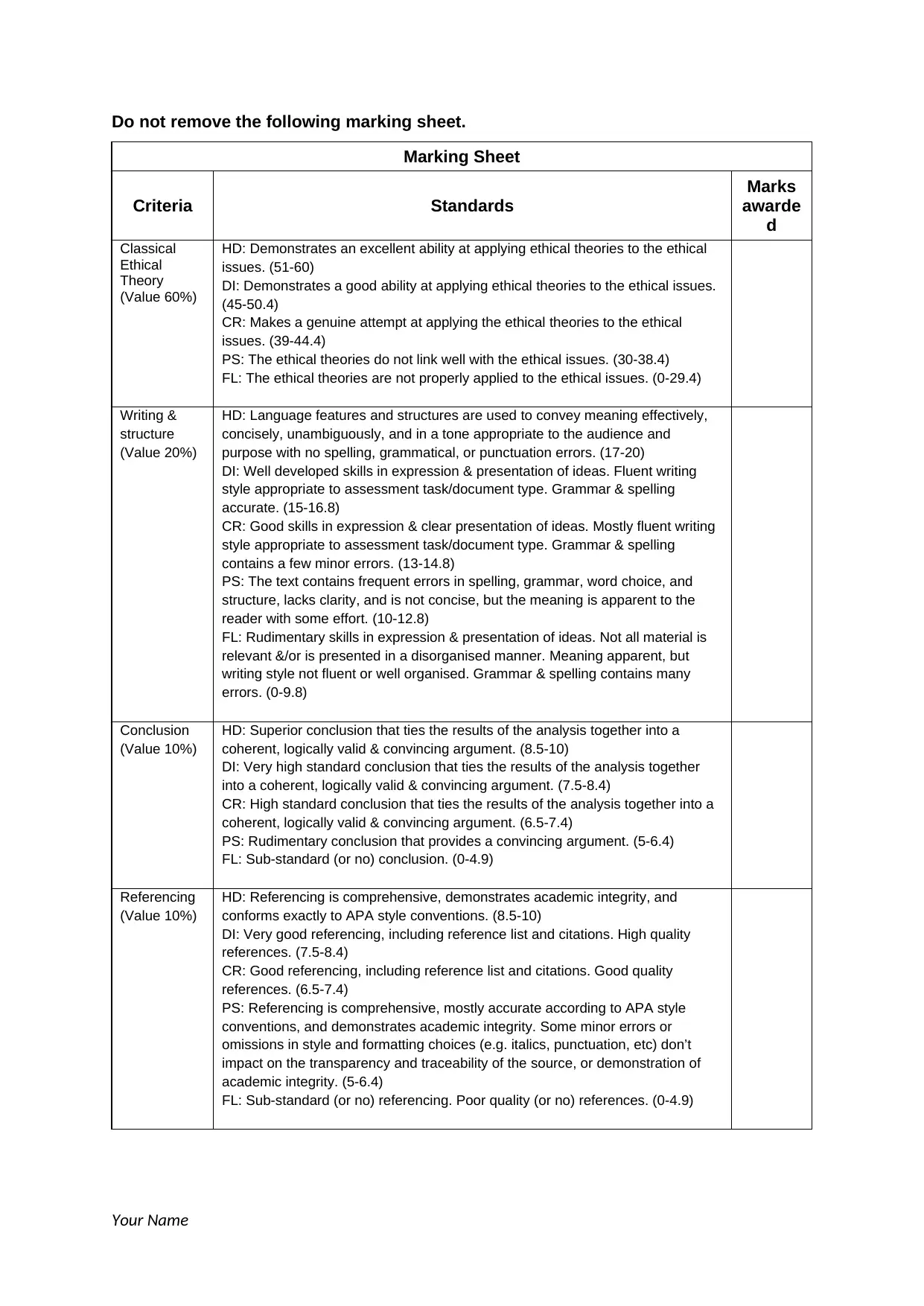
Do not remove the following marking sheet.
Marking Sheet
Criteria Standards
Marks
awarde
d
Classical
Ethical
Theory
(Value 60%)
HD: Demonstrates an excellent ability at applying ethical theories to the ethical
issues. (51-60)
DI: Demonstrates a good ability at applying ethical theories to the ethical issues.
(45-50.4)
CR: Makes a genuine attempt at applying the ethical theories to the ethical
issues. (39-44.4)
PS: The ethical theories do not link well with the ethical issues. (30-38.4)
FL: The ethical theories are not properly applied to the ethical issues. (0-29.4)
Writing &
structure
(Value 20%)
HD: Language features and structures are used to convey meaning effectively,
concisely, unambiguously, and in a tone appropriate to the audience and
purpose with no spelling, grammatical, or punctuation errors. (17-20)
DI: Well developed skills in expression & presentation of ideas. Fluent writing
style appropriate to assessment task/document type. Grammar & spelling
accurate. (15-16.8)
CR: Good skills in expression & clear presentation of ideas. Mostly fluent writing
style appropriate to assessment task/document type. Grammar & spelling
contains a few minor errors. (13-14.8)
PS: The text contains frequent errors in spelling, grammar, word choice, and
structure, lacks clarity, and is not concise, but the meaning is apparent to the
reader with some effort. (10-12.8)
FL: Rudimentary skills in expression & presentation of ideas. Not all material is
relevant &/or is presented in a disorganised manner. Meaning apparent, but
writing style not fluent or well organised. Grammar & spelling contains many
errors. (0-9.8)
Conclusion
(Value 10%)
HD: Superior conclusion that ties the results of the analysis together into a
coherent, logically valid & convincing argument. (8.5-10)
DI: Very high standard conclusion that ties the results of the analysis together
into a coherent, logically valid & convincing argument. (7.5-8.4)
CR: High standard conclusion that ties the results of the analysis together into a
coherent, logically valid & convincing argument. (6.5-7.4)
PS: Rudimentary conclusion that provides a convincing argument. (5-6.4)
FL: Sub-standard (or no) conclusion. (0-4.9)
Referencing
(Value 10%)
HD: Referencing is comprehensive, demonstrates academic integrity, and
conforms exactly to APA style conventions. (8.5-10)
DI: Very good referencing, including reference list and citations. High quality
references. (7.5-8.4)
CR: Good referencing, including reference list and citations. Good quality
references. (6.5-7.4)
PS: Referencing is comprehensive, mostly accurate according to APA style
conventions, and demonstrates academic integrity. Some minor errors or
omissions in style and formatting choices (e.g. italics, punctuation, etc) don’t
impact on the transparency and traceability of the source, or demonstration of
academic integrity. (5-6.4)
FL: Sub-standard (or no) referencing. Poor quality (or no) references. (0-4.9)
Your Name
Marking Sheet
Criteria Standards
Marks
awarde
d
Classical
Ethical
Theory
(Value 60%)
HD: Demonstrates an excellent ability at applying ethical theories to the ethical
issues. (51-60)
DI: Demonstrates a good ability at applying ethical theories to the ethical issues.
(45-50.4)
CR: Makes a genuine attempt at applying the ethical theories to the ethical
issues. (39-44.4)
PS: The ethical theories do not link well with the ethical issues. (30-38.4)
FL: The ethical theories are not properly applied to the ethical issues. (0-29.4)
Writing &
structure
(Value 20%)
HD: Language features and structures are used to convey meaning effectively,
concisely, unambiguously, and in a tone appropriate to the audience and
purpose with no spelling, grammatical, or punctuation errors. (17-20)
DI: Well developed skills in expression & presentation of ideas. Fluent writing
style appropriate to assessment task/document type. Grammar & spelling
accurate. (15-16.8)
CR: Good skills in expression & clear presentation of ideas. Mostly fluent writing
style appropriate to assessment task/document type. Grammar & spelling
contains a few minor errors. (13-14.8)
PS: The text contains frequent errors in spelling, grammar, word choice, and
structure, lacks clarity, and is not concise, but the meaning is apparent to the
reader with some effort. (10-12.8)
FL: Rudimentary skills in expression & presentation of ideas. Not all material is
relevant &/or is presented in a disorganised manner. Meaning apparent, but
writing style not fluent or well organised. Grammar & spelling contains many
errors. (0-9.8)
Conclusion
(Value 10%)
HD: Superior conclusion that ties the results of the analysis together into a
coherent, logically valid & convincing argument. (8.5-10)
DI: Very high standard conclusion that ties the results of the analysis together
into a coherent, logically valid & convincing argument. (7.5-8.4)
CR: High standard conclusion that ties the results of the analysis together into a
coherent, logically valid & convincing argument. (6.5-7.4)
PS: Rudimentary conclusion that provides a convincing argument. (5-6.4)
FL: Sub-standard (or no) conclusion. (0-4.9)
Referencing
(Value 10%)
HD: Referencing is comprehensive, demonstrates academic integrity, and
conforms exactly to APA style conventions. (8.5-10)
DI: Very good referencing, including reference list and citations. High quality
references. (7.5-8.4)
CR: Good referencing, including reference list and citations. Good quality
references. (6.5-7.4)
PS: Referencing is comprehensive, mostly accurate according to APA style
conventions, and demonstrates academic integrity. Some minor errors or
omissions in style and formatting choices (e.g. italics, punctuation, etc) don’t
impact on the transparency and traceability of the source, or demonstration of
academic integrity. (5-6.4)
FL: Sub-standard (or no) referencing. Poor quality (or no) references. (0-4.9)
Your Name
⊘ This is a preview!⊘
Do you want full access?
Subscribe today to unlock all pages.

Trusted by 1+ million students worldwide

Total
Marks
Your Name
Marks
Your Name
1 out of 7
Related Documents
Your All-in-One AI-Powered Toolkit for Academic Success.
+13062052269
info@desklib.com
Available 24*7 on WhatsApp / Email
![[object Object]](/_next/static/media/star-bottom.7253800d.svg)
Unlock your academic potential
Copyright © 2020–2026 A2Z Services. All Rights Reserved. Developed and managed by ZUCOL.




